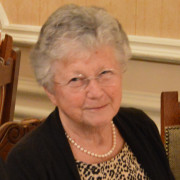Louise Honeyman – Recollections from Margaret Archibald
Personal Recollections of Louise Honeyman
The ‘phone rang. “Is that Margaret Archibald?” “Speaking.” “It’s Louise Honeyman; are you free on…” Just one more musician fixed for a date, but for me this was the beginning of a professional and personal relationship that was quite literally to change my life.
It was Louise who booked me near the start of my career for the Thames Chamber Orchestra and the English Symphony Orchestra, often playing for choral societies; it was Louise who seized on my enthusiasm for the C clarinet, asked if I was interested in authentic performance and launched me on my career as a period instrument player with my first date a Prom with the Academy of Ancient Music; it was Louise who helped me make the arrangements to have a babysitter with me on the flights and in the hotels when I took my four-and-a-half month old baby to Toulouse, Paris and Geneva; it was Louise who facilitated the arrangements when Lina Lalandi needed my seven year old son to be a Prince on stage for Gluck’s Alceste in Monaco; it was Louise who invited me to be sub- Principal clarinet of the London Mozart Players under Jane Glover and who told the wind players that she wanted us to form a wind chamber ensemble because she thought we deserved it. Finally, for me most life-changing of all, it was Louise who invited me to set up the “first year” of education and community work when the LMP became resident orchestra in Croydon, setting me on a course that saw me obsessively run the orchestra’s education work for the next 21 years.
Louise was more than just a fixer, she was a friend, a counsellor in times of trouble, always there to talk through a problem whether professional or personal. She would fight her corner but equally would listen to another point of view. She was a woman with a mission, and if this meant sacrificing a house and garden in north-west London for a tiny attic flat above the office in Croydon, this was something she cheerfully undertook to do in order to pursue her goal of fostering and building the London Mozart Players. Louise’s devotion to the orchestra was absolute, and she was always at every concert, sitting backstage busy with administrative tasks and ready to deal with any queries, comments, opinions or worries. I remember the anniversary of German re-unification when she bought the entire orchestra lunch in Dresden, following our morning concert there before we set out on another long coach journey to Leipzig for a concert that same evening in the Thomaskirche. On another occasion Louise chartered a plane to get us home from Lyons using an out-of-the-way military airfield somewhere for a late-night flight. She came with us on the ferry to Boulogne for the Menuhin Competition, and on the way home soothed the French customs officials who suffered a complete sense of humour failure when the mother of a young Japanese soloist took flash photos at the border post.
Memories of Louise are inextricably bound up with mental images of David, her partner, with whom she made common cause, building a vibrant community from a disparate group of freelance musicians and showing the way that an orchestra can be embedded in its local community through its outreach work. I was so lucky and honoured to be trusted by Louise to develop the LMP education and community work, and I threw all my personal creativity and energy at the project. At first I referred to Louise for every tiny decision until the day when she said, “Margaret, I haven’t got time to answer all these questions, just sort it out!” I went on “just sorting it out” for more than two decades and gained a wealth of experience, meeting many inspirational people in schools, nursing homes, hospitals, hospices, kids clubs, youth clubs and local authorities, and above all working with many wonderful colleagues who remain my very closest friends and with whom I continue to work now under the banner of my new charity Everyone Matters. Louise is a hard act to follow but I hope I can make even half the contribution that she did.
Margaret Archibald



